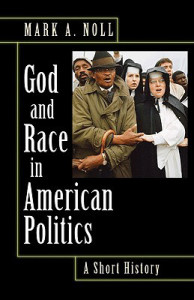
God and Race in American Politics: A Short History, Mark A. Noll. Princeton, NJ: Princeton University Press, 2008.
Summary: This text explores the interwoven story of religion, race, and politics in American history, with a concluding theological reflection.
Mark Noll makes the observation in this book, derived from his Stafford Little Lectures at Princeton University in 2006, that we have one of the most enlightened political systems in human history and yet we have failed signally in the matter of race. From our beginnings we accepted the slave trade that treated forcibly seized Africans as cargo that were simply one more asset to serve American interests. After the Civil War and the failure of Reconstruction, we settled for systemic injustices in the form of Jim Crow laws that a number would argue continue in some form down to the present.
What Noll does in this “short history” is look at the interplay of religious influences, shifting party affiliations and voting patterns and the continuing saga of race in America. As a careful scholar, he documents his narrative with numerous tables on denominational populations and party voting patterns by various states and populations.
He begins by looking at how the Bible was used to argue both for and against slavery. Interestingly, those who were pro-slavery held back from arguing for White slavery, revealing the racial animus behind this issue. In this racial divide he traces the origins and rise of African-American churches who would be a critical factor in years to come in civil rights advocacy. He concludes this chapter (2) with these prophetic words by W.E.B. DuBois:
This nation will never stand justified before God until these things are changed. . . . Especially are we surprised and astonished at the recent attitude of the church of Christ–on the increase of a desire to bow to racial prejudice, to narrow the bounds of human brotherhood, and to segregate black men in some outer sanctuary (cited on p. 59).
The book traces the the failed efforts of Reconstruction (“Redemption” in the South) and the alignments of southern Whites (comprised of large Baptist and Methodist populations) with the Democratic Party while Blacks who could vote as well as northern Protestants aligned with “the party of Lincoln.” He recounts the rise of Jim Crow and the failure of the courts and political processes along with the lack of engagement (and some complicity) of white Evangelicals with these injustices.
Meanwhile, an African-American church was rising in organizational strength and the training of its pastors. Noll traces the antecedent influences on King and other civil rights leaders and how central the religious voice was to this movement.
A significant turning point came in 1964 with the passage of sweeping civil rights legislation under Democrat Lyndon Johnson. A major political realignment began, where the once Democratic white south became Republican, and the Democratic Party became one of northern liberals, mainline Protestants (a declining group) and ethnic minorities while Evangelicals and some Catholics identified with the small government, morally conservative policies of the Republicans.
One fascinating sidelight Noll observes is the emergence of southern Evangelicals on the national stage in this period. Having come out from an apparent identification with racism as a result of civil rights legislation, denominations like the Southern Baptists and figures like Jerry Falwell (and Bill Clinton) gain national platforms.
Noll concludes the book with a theological reflection. He notes the mixed history of Christian complicity with racial injustice and advocacy for civil rights and “the beloved community.” While not justifying the evils, he argues that in Christian theology’s understanding of both human evil and the redemptive arc of the gospel, there are the resources to help us neither be surprised by evil nor the acts of so many who selflessly pursue justice. It is a theology of realistic hope rather than starry-eyed optimism or pessimistic despair.
This is a book for anyone engaged in issues of racial reconciliation or who are trying to understand the complex interplay of religion and American politics around these issues. As in so many things, understanding where we’ve come from is critical to understanding where we are and discerning the road before us. This book can help.
Editor’s Note: Thank-you to Bob Trube for sharing his reviews with Emerging Scholars! Bob first posted the above review on Bob on Books. As you may remember, this spring Joshua Wu has given significant attention to the Evangelical voter. Please join me in praying for discernment for the people of God as we press into this election season. Thank-you. To God be the glory! ~ Thomas B. Grosh IV, Associate Director, Emerging Scholars Network
Bob Trube is Associate Director of Faculty Ministry and Director of the Emerging Scholars Network. He blogs on books regularly at bobonbooks.com. He resides in Columbus, Ohio, with Marilyn and enjoys reading, gardening, choral singing, and plein air painting.

Leave a Reply